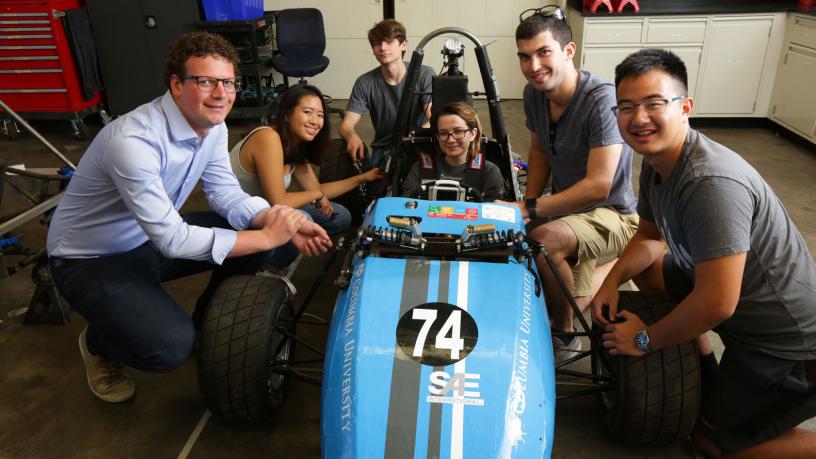Racing Ahead
Buckle up—in a decade electric vehicles (EVs) will be just as affordable as conventional cars, experts expect, and by 2050 they will have all but replaced their gas-guzzling ancestors on America’s roads.
So what better time than now for Columbia Engineering students to develop an EV of their own?
It isn’t an idle question: faculty researchers like Matthias Preindl, professor of electrical engineering, work at the forefront of developing better batteries and smarter engines, while the students of Knickerbocker Motorsports build formidable racecars that compete nationally in the Formula SAE (FSAE) competition.
Now, under Preindl’s leadership, the departments of electrical and mechanical engineering have joined forces to help a new student team confront the problems of accelerating a 600-lb EV to high velocities—and hopefully race next June at FSAE’s electric nationals in Nebraska.

Electrical Engineering Professor Matthias Preindl (left) leads the new electric vehicle Formula SAE team.
“EVs are the future of cars,” said Max Moeller ’19, a senior member of the team. “They can be better than combustion vehicles in pretty much every way: super-fast right from the start, quiet, and environmentally friendly.”
“Reducing carbon emissions is all well and good, but humans have to drive the electric cars,” Preindl noted, “and to want to drive them.”
If you’re interested in vehicle engineering, you can’t get a better experience than this.
Fortunately, the students won’t be starting from scratch. A separate group of Knickerbockers are constructing a new internal combustion vehicle on a new chassis, bequeathing to the EV team last year’s model. Already extensively iterated, this converted chassis will now receive a full reworking of its power delivery system in Mudd Hall’s state-of-the-art machine shop. In the process, the EV team will work with faculty to take on complex interconnected challenges of battery management, power conversion, control systems, and packaging.
“Vehicle engineering is very much a systems engineering problem—no system in a car lives in a vacuum and every system relates to the other systems,” said Josh Browne PhD’16, an adjunct professor of mechanical engineering and former NASCAR crew chief who advises the teams with Jeffrey Kysar, professor and chair of mechanical engineering.
Beyond building high-performance vehicles, the FSAE competition also introduces students to broader challenges of logistics, analysis, and overall project management applicable in countless fields.
“In school, we teach you how to deal with the laws of physics and chemistry, and that’s what you need to deal with in order to make a good design,” Kysar said. “When you begin managing a project like this, an entirely different law kicks in: Murphy’s Law, that everything that can go wrong will go wrong. Project management is about managing Murphy’s Law so you are anticipating the issues coming up in the future.”
So ambitious are the new team’s plans, and so compelling the challenges they face, that students will be able to incorporate projects into class work and potentially even earn course credit for their innovations.
“If you’re interested in vehicle engineering, you can’t get a better experience than this.” Browne said.
